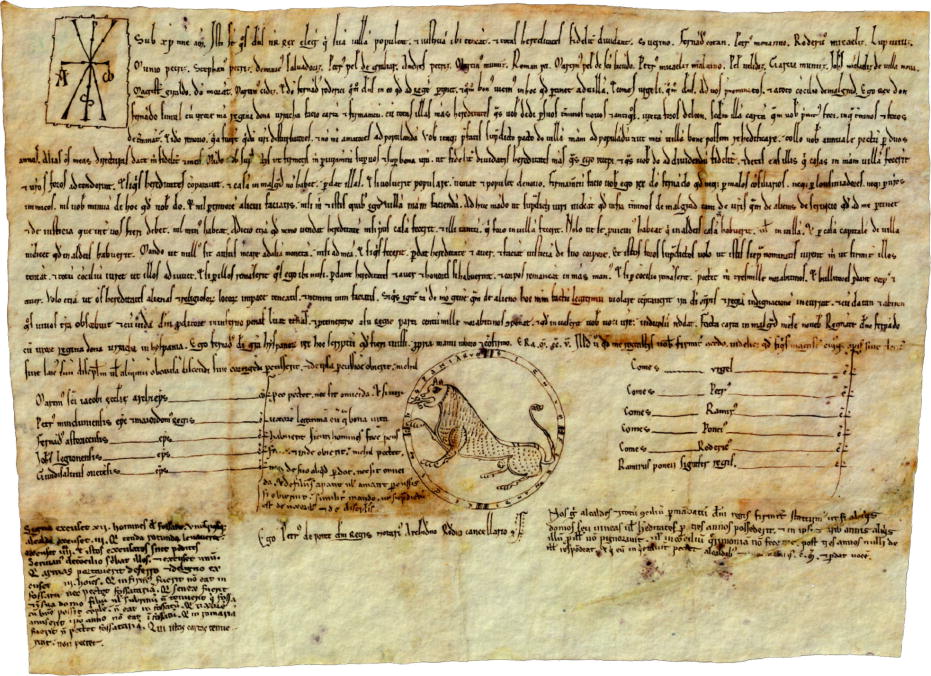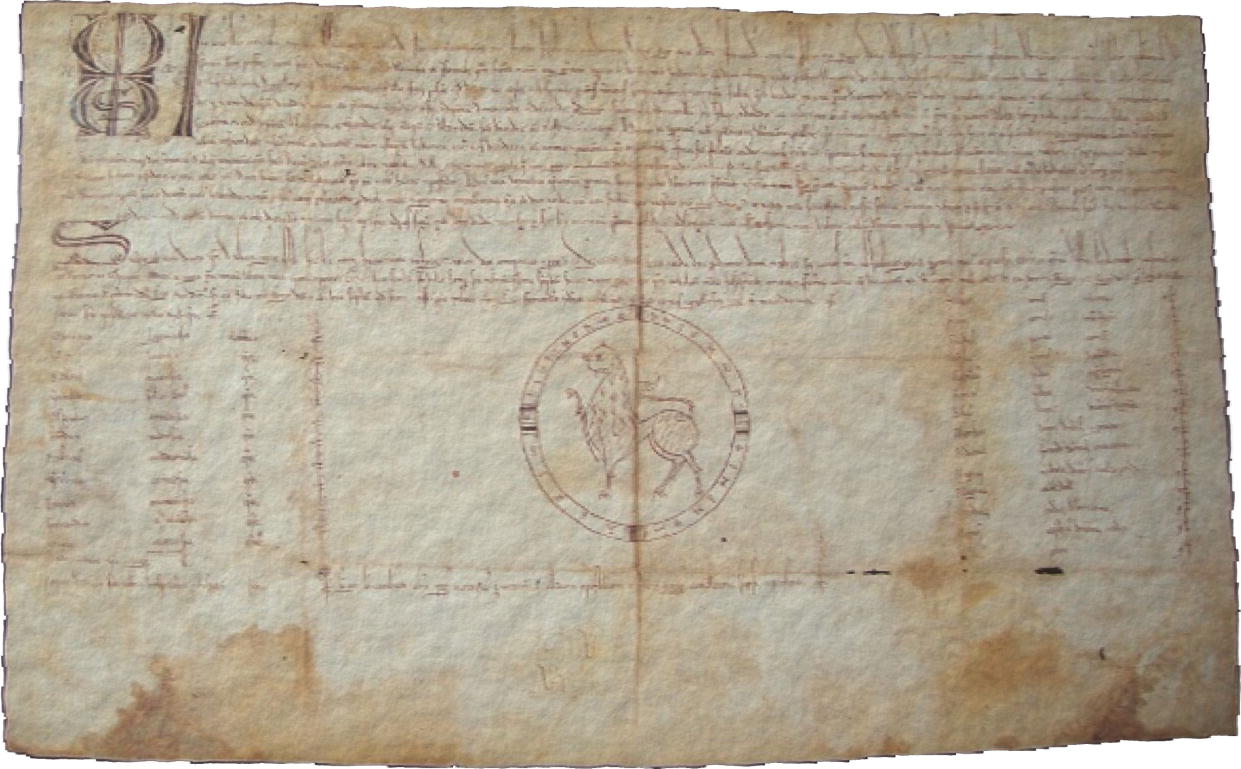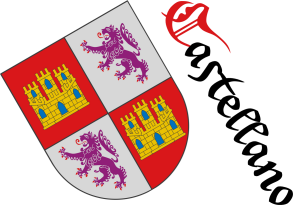
![Ver [Fernando II de León; 1167] en referencias bibliográficas. Libro abierto, hojas de plata, filo de oro, guardas de gules, tapas de sable.](../css/Libro.Bibliografia.png)
Fernando II de León; 1167
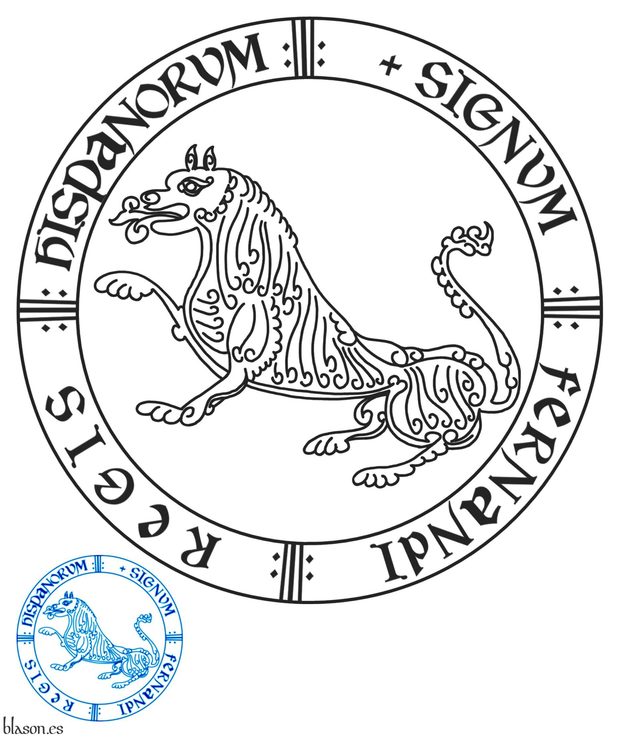
Fernando II, King of León, «Carta Puebla de Benavente», Historical Archive of the City Council of Benavente, dated November 1167.
It is a document in which King Fernando II of León grants privileges to Benavente with the aim of repopulating this town.
The original document is a parchment measuring 60 x 43 centimeters, adorned in the upper right corner, right according to the heraldic criterion, with a Chi Rho from which hang an alpha and an omega. In what could be considered the navel of the charter is a rolled seal of the king formed by a lion, which I consider closer to rampant than passant, surrounded by a circular motto that reads «Signum Fernandi Regis Hispanorum» ~ «Sign of Fernando, King of the Spains». Additionally, this rolled seal is accompanied by the names of members of the chancery and prelates of the Kingdom of León, to confirm the grants recorded in the «Carta Puebla de Benavente».
This charter, also called the «Fuero de Benavente», is a beautiful example of local law and, since its promulgation in 1167, served as a model for other towns. In the following years, similar charters to that of Benavente were adopted in other towns of León, Asturias, and Galicia, with the one in La Coruña being a notable example.
The objective of the provisions of this charter was to favor the repopulation and settlement of new settlers in the town of Benavente, and its successful operation in this aspect led to its application in other places.
The original document is kept in the Municipal Archive of Benavente, forming part of its collection of royal privileges of Benavente. There is also a «facsimile» edition, like the one that illustrates this bibliographic reference, published in 2002 by the Benavente City Council on the occasion of the Commemoration of the VIII Centenary of the Benavente Courts.
Bibliographical reference of century XII.
The author is Fernando II de León.
Bibliographic reference mentioned in the following articles:
External resources:
- Benavente remembers Fernando II of León.
- Churches in the parish of Renueva.
- Facsimile of the Carta Puebla de Benavente.
- Carta Puebla in PDF.
Internal resources: FernandoII.24.Facsimil.CartaPueblaBenavente.pdf in armorial, Fernando II of León, key 104..


![Ver [Fernando II de León; 1181] en referencias bibliográficas. Libro abierto, hojas de plata, filo de oro, guardas de gules, tapas de sable.](../css/Libro.Bibliografia.png)
Fernando II de León; 1181
Fernando II, King of León, «Privilegio de Ampliación del Alfoz de Benavente», Historical Archive of the City Council of Benavente, 1181.
Bibliographical reference of century XII.
Author: Fernando II de León.
Bibliographic reference mentioned in the following articles:
External resource:


![Ver [Martín Fuertes, J. A.; 2002] en referencias bibliográficas. Libro abierto, hojas de plata, filo de oro, guardas de gules, tapas de sable.](../css/Libro.Bibliografia.png)
Martín Fuertes, J. A.; 2002
José Antonio Martín Fuertes, Universidad de León, «El Signum Regís en el Reino de León (1157-1230), Notas Sobre su Simbolismo (I)», Revista Argutorio, 4th year, number 9, pages 15 to 19, Cultural Magazine edited by the Monte Irago Cultural Association, Astorga, 2nd half of 2002.
Bibliographical reference of century XXI.
The author is Martín Fuertes, José Antonio.
Here are the articles quoting this reference:
External resources:
Internal resources: MartinFuertesJA2002.SignumRegis.pdf.


![Ver [Sevilla Gómez, A.; 2000] en referencias bibliográficas. Libro abierto, hojas de plata, filo de oro, guardas de gules, tapas de sable.](../css/Libro.Bibliografia.png)
Sevilla Gómez, A.; 2000
Antonio Sevilla Gómez, «Las paremias heroicas: la divisa, el lema y el mote», Paremia Magazine, number 9, pages 75 to 80, Madrid, 2000.
Bibliographical reference of century XX.
The author is Sevilla Gómez, Antonio.
Bibliographical reference mentioned in the following article:
External resource:
Internal resources: SevillaGomezA2000.DivisaLemaMoteGritoGuerra.pdf.


Henry II of England
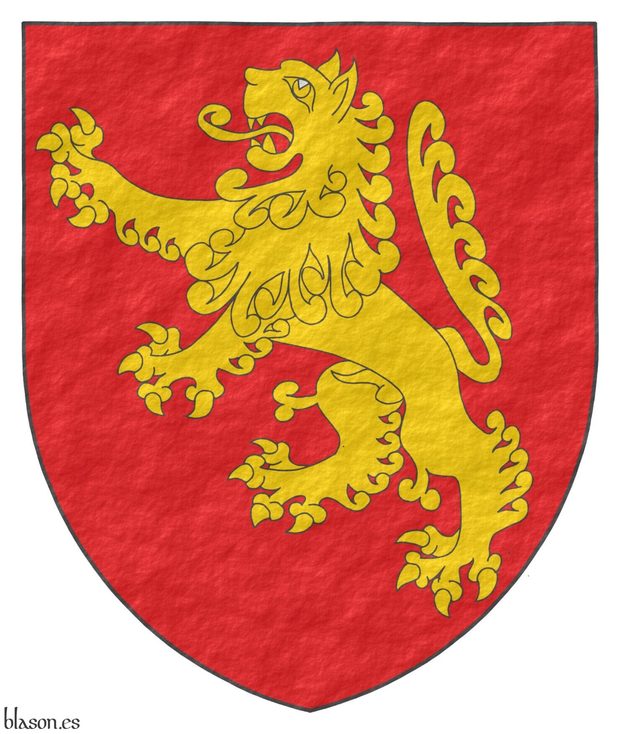
Henry II Plantagenet, King of England, Duke of Normandy, Duke of Aquitaine, Count of Anjou, Count of Maine, and Count of Nantes.
Gules, a lion rampant Or.
Escudo de gules, un león rampante de oro.
Existing arms interpreted by me as follows: the shield's shape is pointed; the field has been enamelled in flat Gules; the lion in Or has been outlined in Sable; and the whole composition has a rough texture finish.
It is believed that Henry I was the first King of England to have a coat of arms, featuring a single lion rampant, but no documentary evidence has yet been found [Rabbow, A.; 1999; paragraph 8].
[Ailes, A.; 1982; page 62] argues that Henry II may have used three different versions of his arms featuring a) a single lion rampant, b) two leopards, and c) three leopards. However, it remains unclear whether these versions were used sequentially over time or concurrently. For this interpretation, I have chosen the version with the lion rampant.
Blazon keywords: Without divisions, Gules, One, Lion, Or and Rampant.
Style keywords: Pointed, Plain tincture, Outlined in sable and Rough.
Classification: Interpreted, Coat of arms, Personal, House of Plantagenet and Kingdom of England.
Bearer: Henry II of England.


![Ver [Ailes, A.; 1982] en referencias bibliográficas. Libro abierto, hojas de plata, filo de oro, guardas de gules, tapas de sable.](../css/Libro.Bibliografia.png)
Ailes, A.; 1982
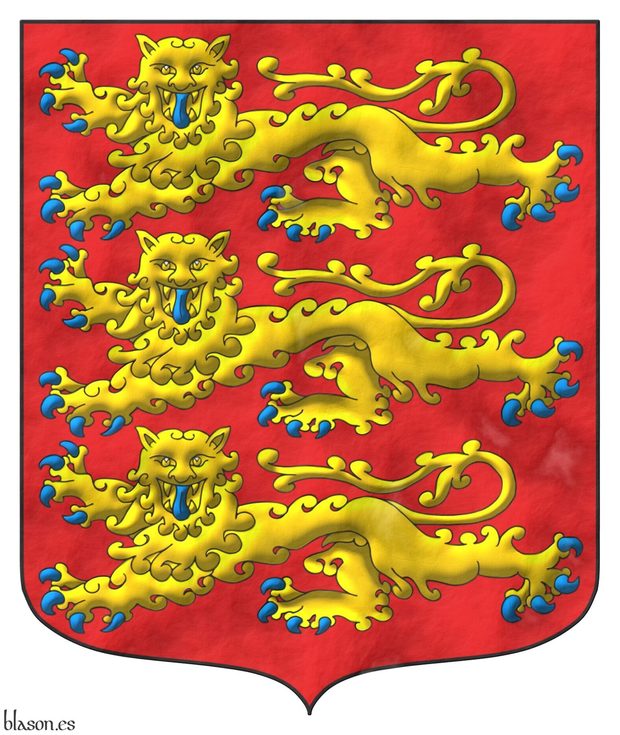
Adrian Ailes, «The Origins of the Royal Arms of England: Their Development to 1199», foreword by Rodney Dennys, includes 27 black and white illustrations, Graduate Centre for Medieval Studies, Reading University, 126 pages, ISBN 07-049077-6-3, Reading, Berkshire, 1982.
An article reviewing this book is: Brigitte Bedos Rezak, Archives nationales de Paris and Metropolitan Museum of Art, «The Origins of the Royal Arms of England, their Development to 1199 by Adrian Ailes», Speculum, volume 60, number 2, pages 373-376, Medieval Academy of America, Cambridge, Massachusetts, April of 1985.
Bibliographical reference of century XX.
Author: Ailes, Adrian.
The following article cites this bibliographic reference:
External link:


![Ver [Rabbow, A.; 1999] en referencias bibliográficas. Libro abierto, hojas de plata, filo de oro, guardas de gules, tapas de sable.](../css/Libro.Bibliografia.png)
Rabbow, A.; 1999
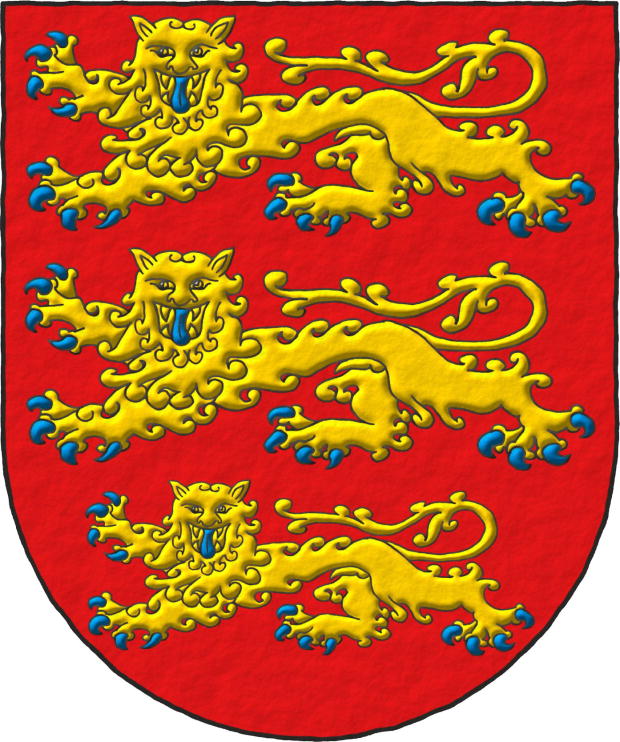
Arnold Rabbow, «The Origin of the Royal Arms of England - a European Connection», Coat of Arms, COA, An Heraldic Quarterly Magazine, número 186, The Heraldry Society, Baldock, Hertfordshire, verano de 1999.
This bibliographical reference is illustrated wit the coat of arms of the Kingdom of England interpreted by me with the with a semi-circle shape.
Bibliographical reference of century XX.
Author: Rabbow, Arnold.
The following article cites this bibliographic reference:
External link:
Internal resources: RabbowA1999.OriginRoyalArmsEnglandEuropeanConnection.docx.


Leonor de Aquitania
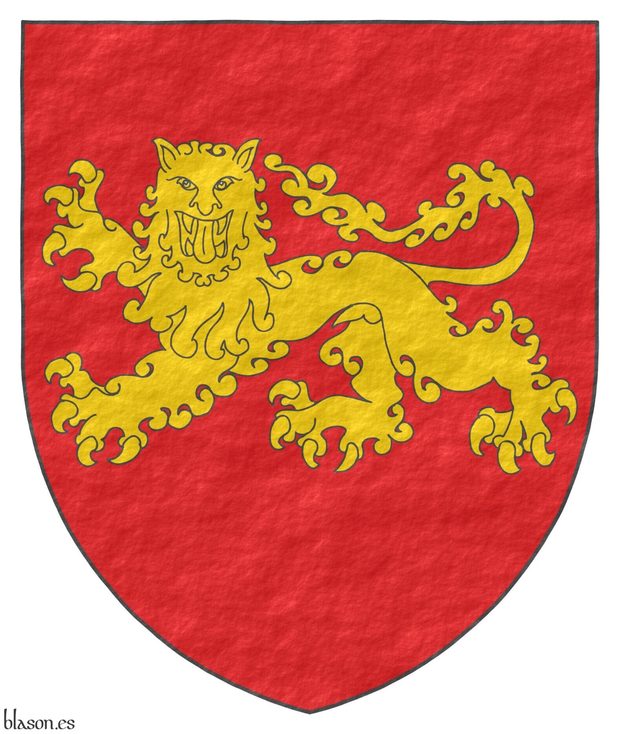
Duchess of Aquitaine, Queen Consort of France (1137-1152), and Queen Consort of England (1154-1189).
Gules, a lion passant, guardant Or.
Escudo de gules, un leopardo de oro.
Existing arms interpreted by me as follows: the escutcheon's shape is pointed; the field has been enamelled in flat Gules; the leopard in Or is outlined in Sable; and the whole composition has a rough texture finish.
I have blazoned it as a leopard, which is the term used for a lion when passant, [Avilés, J.; 1725a; pages 290 and 295] and [Avilés, J.; 1780a; pages 325 and 330] «a lion, whose natural position is rampant;... unlike the leopard, which is... always passant» and «leopards have... their heads facing forward, showing both eyes,... lions are... in profile, revealing only one eye... Their posture is never rampant, like the lion’s, but always passant;... if leopards are ever depicted rampant, they are blazoned as ‘leopard-lions’,... and likewise, lions that are passant are blazoned as ‘lion-leopards’.».
For this interpretation of Eleanor’s coat of arms, I have followed [Edward IV of England; 1461; shield 18], where a leopard Or appears, but neither armed nor langued in Azure, representing the Duchy of Aquitaine.
Blazon keywords: Without divisions, Gules, One, Leopard and Or.
Style keywords: Pointed, Plain tincture, Outlined in sable and Rough.
Classification: Interpreted, Personal, Coat of arms, Duchy of Aquitaine, Kingdom of France and Kingdom of England.
Bearer: Leonor de Aquitania.

Continue with: Leonor de Aquitania y Enrique de Inglaterra.
-
Language
-
Categories of heraldry
-
Divisions of the field
- Without divisions
- Party per pale
- Party per fess
- Party per bend
- Party per bend sinister
- Tierce
- Tierce sinister
- Tierced per pale
- Tierced per fess
- Tierced per bend
- Tierced pallwise inverted
- Quarterly
- Quarterly per saltire
- Gyronny
- Party per fess, the chief per pale
- Party per pale, the sinister per fess
- Party per fess, the base per pale
- Party per pale, the dexter per fess
- Chapé
- Chaussé
- Embrassé
- Contre-embrassé
- Party per chevron
- Enté
- Enté en point
- Flanched
-
Metals
-
Colours
-
Furs
-
Other tinctures
-
Ordinaries and sub-ordinaries
-
Diminutives of the ordinaries
-
Geometric charges
-
Composite ordinaries
-
Inanimate charges from Nature
Atom, Crescent, Diamond, Emerald, Estoile, Increscent, Lightning flash, Moon, Mount, Mullet, Mullet of four points, Orbital, Plough of Ursa Major, Rainbow, Ray of the sun, River, Sea, Snowflake, Sun, Sun in splendour, Sun of May, Trimount, Water and Wave.
-
Vegetal charges from Nature
Acorn, Apple, Apple tree, Ash, Bluebonnet, Camellia, Chrysanthemum, Cinquefoil, Cornflower, Dogwood flower, Double rose, Eguzki-lore, Elm, Fleur de lis, Flower, Gourd, Holm oak, Hop cone, Indian paintbrush, Kapok tree, Laurel, Lily, Linden, Lotus flower, Madonna lily, Mexican cedar tree, Oak, Olive tree, Palm tree, Plantain plant, Pomegranate, Poplar leaf, Rose, Shamrock, Sunflower, Thistle, Tree, Tulip, Vine and Wheat.
-
Animal charges from Nature
Badger, Bald eagle, Barbel, Barn owl, Bear, Beaver, Bee, Beetle, Bighorn sheep, Binson, Blackbird, Boar, Brach hound, Bull, Cow, Doe, Dog, Dolphin, Dove, Eagle, Elephant, Falcon, Female figure, Fish, Flame, Fly, Fox, Frog, Goat, Goldfinch, Goose, Heron, Horse, Hummingbird, Jaguar, Lark, Leopard, Lion, Lion passant, Lion rampant guardant, Lioness, Lynx, Male figure, Martlet, Merino ram, Owl, Panther, Parrot, Peacock, Pelican, Pelican in her piety, Pronghorn, Puffin, Quetzal, Raven, Roe deer, Rooster, Savage, Seagull, Serpent, She-wolf, Stag, Starling, Talbot, Turtle, Tyger, Vulture, Warren hound and Wolf.
-
Parts of natural charges
Arm, Beak, Branch, Caboshed, Chest, Claw, Covert, Dorsal fin, Eagle claw, Ear of wheat, Ermine spot, Escallop, Feather, Foot (palmiped), Foreleg, Forepaw, Hand, Head, Heart, Hoof, Leaf, Neck, Ostrich feather, Palm frond, Paw, Roe deers' attires, Shoulder, Sprig, Stags' attires, Stem, Swallow-tail, Tail, Tail addorsed, Tail fin, Talon, Tibia, Tooth, Trunk, Trunk (elephant), Two hands clasped, Two wings in vol, Udder, Wing and Wrist.
-
Artificial charges
Ace of spades, Anchor, Anvil, Arch, Arm vambraced, Armillary sphere, Arrow, Axe, Bell, Bell tower, Beret, Bonfire, Book, Bookmark, Bow, Branding iron, Bridge, Broken, Buckle, Cannon, Cannon dismounted, Cannon port, Canopy roof, Carbuncle, Castle, Celtic Trinity knot, Chain, Chess rooks, Church, Clarion, Clay pot, Closed book, Club, Column, Comb, Compass rose, Conductor's baton, Cord, Covered cup, Crozier, Crucible, Cuffed, Cup, Cyclamor, Dagger, Displayed scroll, Double vajra, Drum, Ecclesiastical cap, Fanon, Federschwert, Fleam, Four crescents joined millsailwise, Galician granary, Garb, Gauntlet, Geometric solid, Grenade, Halberd, Hammer, Harp, Host, Hourglass, Key, Key ward, Knight, Knot, Lantern, Letter, Line, Loincloth, Maunch, Menorah, Millrind, Millstone, Millwheel, Monstrance, Mortar, Mullet of six points pierced, Nail, Non-classic artifact, Norman ship, Number, Oar, Oil lamp, Open book, Page, Pair of pliers, Pair of scales, Parchment, Pestle, Piano, Pilgrim's staff, Plough share, Polish winged hussar, Port, Portcullis, Potent, Quill, Ribbon, Rosette of acanthus leaves, Sabre, Sackbut, Sail, Scroll, Scythe, Sheaf of tobacco, Ship, Skirt, Spear, Spear's head, Stairway, Star of David, Step, Sword, Symbol, Tetrahedron, Torch, Tower, Trident, Trumpet, Turret, Two-handed sword, Wagon-wheel, Water-bouget, Wheel, Winnowing fan and With a turret.
-
Immaterial charges
Angel, Archangel, Basilisk, Dragon, Dragon's head, Garuda, Golden fleece, Griffin, Heart enflamed, Justice, Mermaid, Our Lady of Mercy, Ouroboros, Paschal lamb, Pegasus, Phoenix, Sacred Heart of Jesus, Saint George, Sea-griffin, Sea-lion, Trinity, Triton, Unicorn, Winged hand and Wyvern.
-
External elements
-
Heraldic creations
-
References
-
Formats
-
Keywords on this page
Pointed, Armed, Azure, Bibliography, House of Plantagenet, Outlined in sable, Motto (identification), Duchy of Aquitaine, In pale, Coat of arms, Accolé arms, Personal, Gules, Henry II of England, Interpreted, Langued, Leonor de Aquitania, Leopard, Lion, Metal beaten, Or, Without divisions, Rampant, Kingdom of France, Kingdom of England, Kingdom of León, Tilted shield, Rough, Seal, Century XII, Century XX, Century XXI, Plain tincture, Three and One.

